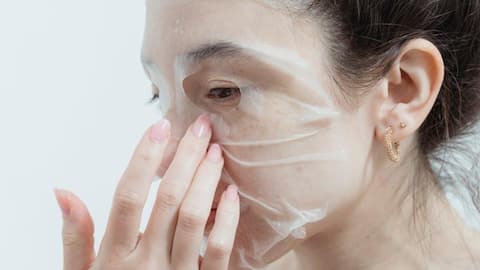Collagen masks: Is it hype or hope for youthful skin
What's the story
Collagen masks have surged in popularity within the skincare industry due to their promising potential to enhance skin health. Collagen, a fundamental protein responsible for skin structure and elasticity, diminishes naturally with age, resulting in the emergence of wrinkles, fine lines, and loss of firmness. These masks are formulated to supply collagen directly to the skin's surface to bolster elasticity.
About collagen
Understanding collagen
Collagen is a protein naturally produced by our bodies, responsible for maintaining skin's firmness and elasticity. As we age, collagen production decreases, leading to the appearance of wrinkles and loss of skin firmness. Collagen masks typically contain ingredients like hydrolyzed collagen, which is broken down into smaller particles for easier absorption into the skin. They aim to replenish lost collagen and improving skin texture.
Smoother skin
Temporary plumping
Upon application, collagen masks can provide a temporary plumping effect, giving the skin a smoother appearance. The moisture and ingredients in the mask can help to temporarily fill in fine lines and wrinkles, making them less noticeable. However, it's essential to recognize that this effect is temporary and may not result in long-term improvements in collagen production or skin firmness.
Absorption
Limited penetration
Despite their claims, collagen molecules in masks are often too large to penetrate deep into the skin's layers. While they may provide surface-level benefits such as hydration and temporary plumping, their ability to stimulate collagen production in deeper layers of the skin is limited. For significant and long-lasting improvements in collagen production professional procedures may be more effective.
Effectiveness
Individual variability
It's important to acknowledge that the effectiveness of collagen masks can vary from person to person. Factors such as age, skin type, genetics, and lifestyle habits all play a role in how well the skin responds to collagen treatments. While some individuals may experience noticeable improvements in skin texture and appearance after using collagen masks, others may see minimal to no difference.
Inconclusive
Limited evidence
Studies on the benefits of topical collagen application, including masks, are limited and inconclusive. Proponents suggest collagen masks may offer benefits beyond direct replenishment. Ingredients like hyaluronic acid, antioxidants, and peptides can enhance the skin's barrier function and stimulate collagen synthesis indirectly. While these masks provide temporary hydration and refreshment, expecting significant anti-aging results solely from them may result in disappointment.
Risks
Potential side effects
Common side effects may include redness, irritation, or allergic reactions, particularly in those with sensitive skin. It's crucial to perform a patch test before applying a collagen mask to the entire face and to discontinue use if any discomfort or adverse reactions occur. Additionally, individuals with specific skin conditions or allergies should consult with a dermatologist before incorporating collagen masks into their skincare regimen.
